Computational complexity of generalized push fight
Author(s)
Demaine, Erik
DownloadPublished version (1.352Mb)
Publisher with Creative Commons License
Publisher with Creative Commons License
Creative Commons Attribution
Terms of use
Metadata
Show full item recordAbstract
© Jeffrey Bosboom, Erik D. Demaine, and Mikhail Rudoy; licensed under Creative Commons License CC-BY 9th International Conference on Fun with Algorithms (FUN 2018). We analyze the computational complexity of optimally playing the two-player board game Push Fight, generalized to an arbitrary board and number of pieces. We prove that the game is PSPACE-hard to decide who will win from a given position, even for simple (almost rectangular) hole-free boards. We also analyze the mate-in-1 problem: can the player win in a single turn? One turn in Push Fight consists of up to two "moves" followed by a mandatory "push". With these rules, or generalizing the number of allowed moves to any constant, we show mate-in-1 can be solved in polynomial time. If, however, the number of moves per turn is part of the input, the problem becomes NP-complete. On the other hand, without any limit on the number of moves per turn, the problem becomes polynomially solvable again.
Date issued
2018Department
Massachusetts Institute of Technology. Computer Science and Artificial Intelligence LaboratoryCitation
Demaine, Erik. 2018. "Computational complexity of generalized push fight."
Version: Final published version